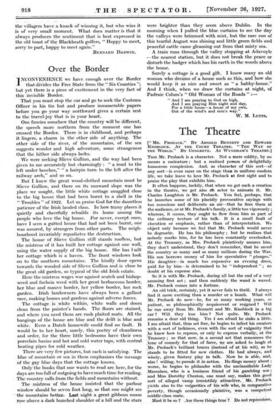Over the Border
INCONVENIENCE we have enough over the Border -I- that divides the Free State from the" Six Counties "; but yet there is a piece of excitement in the very fact of this invisible Border.
That you must stop the car and go to seek the Customs Officer in his tin but and produce innumerable papers before you go your way northward gives a certain zest to the travel-joy that is in your heart.
One fancies somehow that the country will be different, the speech more northern from the moment one has crossed the Border. There is in childhood, and perhaps it lingers, a charm in the other side of anything. The other side of the river, of the mountains, of the sea suggests wonder and high adventure, some strangeness that the hither side always lacks.
We were seeking Slieve Gullion, and the way had been given to me accurately but charmingly : " a road to the left under beeches," " a hairpin turn to the left after the railway arch," and so on.
But I knew the great wood-clothed mountain must be Slieve Gullion, and there on its sunward slope was the place we sought, the little white cottage snuggled close to the big house that had been burnt to a shell in the " Troubles " of 1922. Let us praise God for the dauntless patience of the Irish landed class. In how many places it quietly and cheerfully rebuilds its home among the people who love the big house. For never, except once, have I seen a gutted house that had not been burnt, one was assured, by strangers from other parts. The neigh- bourhood invariably repudiates the destruction.
The house of Slieve Gullion still stands roofless, but the mistress of it has built her cottage against one wall, using the water supply of the big house. She has Luilt her cottage which is a haven. The front windows look on to the southern mountains. The kindly door opens towards the wooded side of Slieve Gullion and is close to the great old garden, so typical of the old Irish estate.
Here the mistress wages war against scutch and bishop- weed and fuchsia weed with her great herbaceous border, her blue and mauve border, her yellow border, her rock garden. Irish landowners have always been a gallant race, making homes and gardens against adverse forces.
The cottage is white within, white walls and doors clean from the painter's hands. The floors are stained, and where you need them are rush plaited mats. All the hangings of the house are blue and the delft is blue and white. Even a Dutch housewife could find no fault. It would be to her heart, surely, this poetry of cleanliness and order, for-the three little bedrooms have their own porcelain basins and hot and cold water taps, with central heating pipes for cold weather.
There are very few pictures, but each is satisfying. The blue of mountain or sea in them emphasizes the message of the gay blue days that the cottage knows.
Only the books, that one wants to read are here, for the days are too full of outgoing to have much time for reading. The country calls from the fields and mountains without. The mistress of the house insisted that the parlour window should be seven foot long, so that one might see the mountains better- Last night a great gibbous moon rose above a dark hunched shoulder of A hill and the stars were brighter than they seem above Dublin. In the morning when I pulled the blue curtains to see the day the valleys were brimmed with mist, but the rare sun of this tearful August was shining and little green fields -and peaceful cattle came gleaming out from that misty sea.
A .train runs through the valley stopping at Adavoyle —the nearest station, but it does not break the peace or disturb the badger which has his earth in the woods above the house.
Surely a cottage is a good gift. I know many an old woman who dreams of a house such as this, and how she would keep it as nice and sweet as " a babby-house." And I think, when we draw the curtains at night, of Padraic Colum's " Old Woman of the Roads "
And I am praying to God on high, And I am praying Him night and day, For a little house—a house of my own, Out of the wind's and rain's way."
W. M. LETTS.






















































 Previous page
Previous page